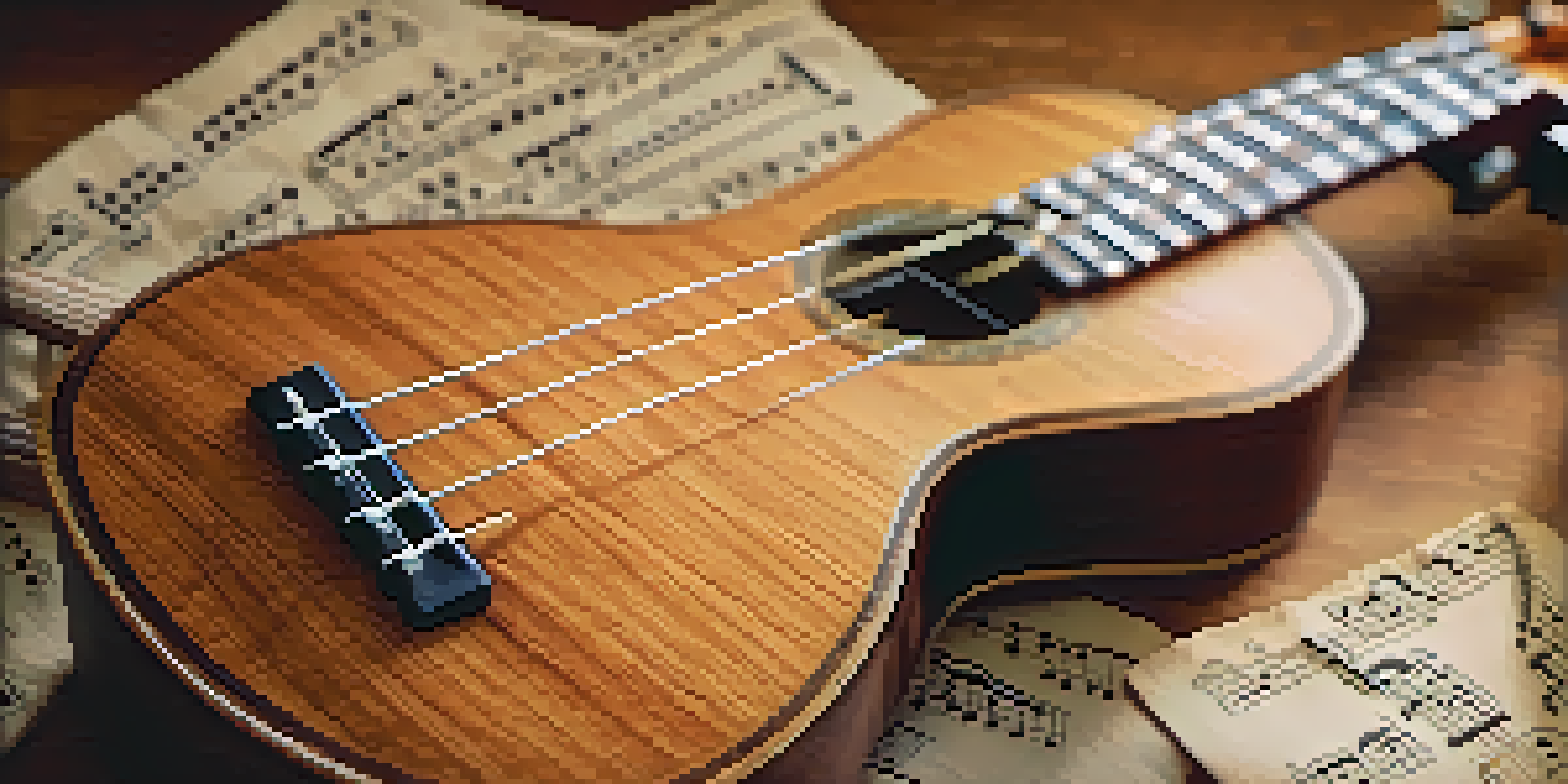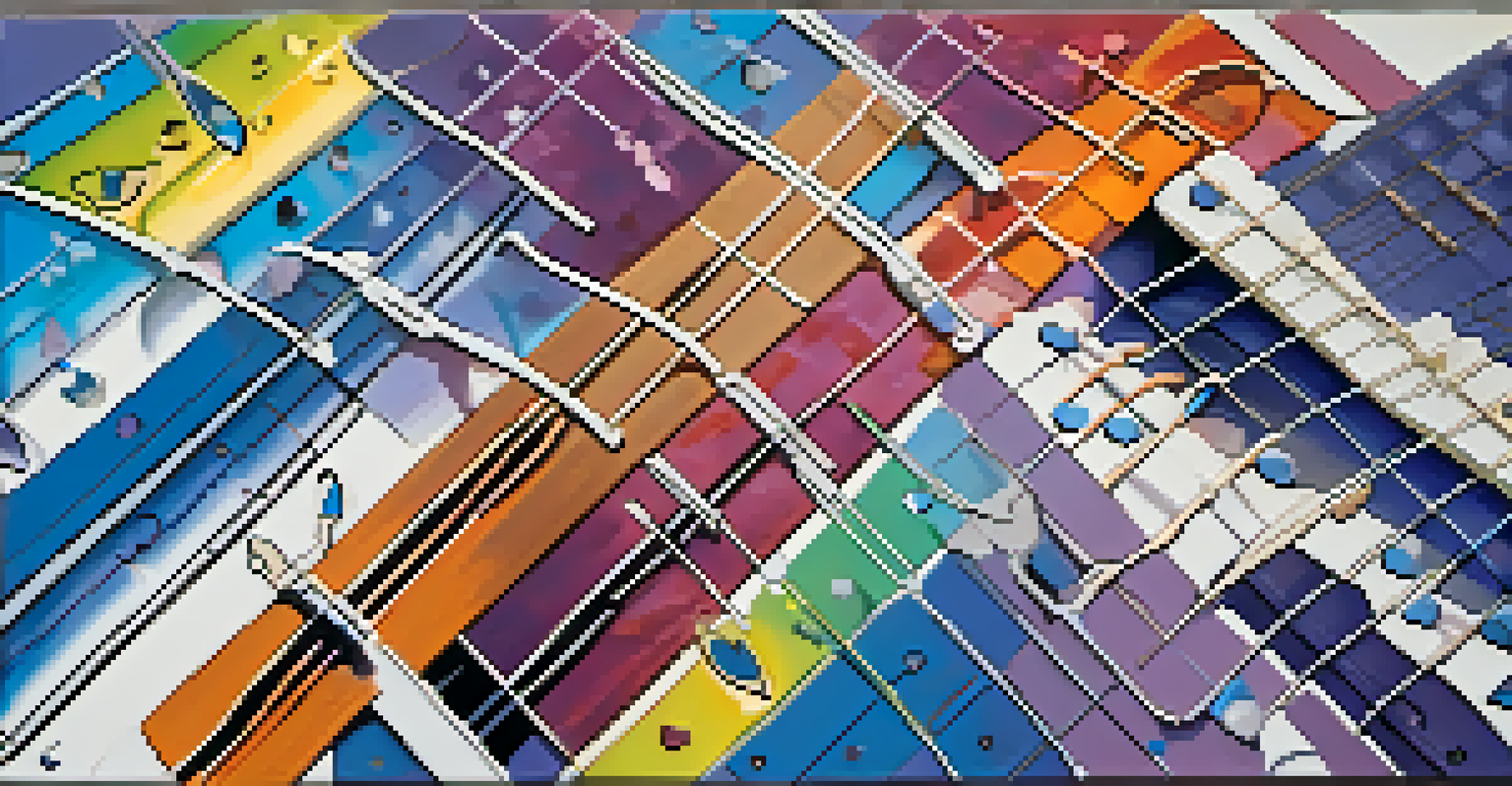Minor Scales for Ukulele Players: Techniques and Applications

Understanding Minor Scales: The Basics for Ukulele Players
Minor scales are essential for adding depth and emotion to your music. Unlike major scales, which often convey happiness, minor scales evoke feelings of sadness or introspection. Familiarizing yourself with these scales opens up a world of musical expression on the ukulele.
Music can change the world because it can change people.
Each minor scale consists of a specific pattern of whole and half steps. For example, the natural minor scale follows the sequence: whole, half, whole, whole, half, whole, whole. Understanding this pattern allows you to create and play minor scales in any key, enhancing your versatility as a player.
As you start practicing minor scales, try to visualize their structure on the ukulele fretboard. This will help you navigate through different keys and understand how minor scales relate to major ones, ultimately enriching your playing experience.
The Different Types of Minor Scales on Ukulele
There are several types of minor scales, including natural, harmonic, and melodic minors. The natural minor scale is the most common, while the harmonic minor introduces a raised seventh note for a unique sound. The melodic minor has a different pattern when ascending versus descending, offering even more diversity in your playing.

Each type of minor scale serves a distinct purpose in music composition and improvisation. For example, the harmonic minor scale is often used in classical and jazz music due to its dramatic sound. On the other hand, the melodic minor can create a smooth, flowing melody, making it ideal for various genres.
Master Minor Scales for Emotion
Understanding and practicing minor scales enhances emotional depth in your music.
Exploring these different types of minor scales will enhance your musical vocabulary and allow for richer improvisation. By practicing each type regularly, you'll discover their unique qualities and how to incorporate them into your ukulele playing.
Techniques for Practicing Minor Scales Effectively
Effective practice techniques can significantly improve your minor scale proficiency. Start by playing slowly and focusing on finger placement and accuracy. Gradually increase your speed as you become more comfortable, ensuring that you maintain clarity and control.
The beautiful thing about learning is that no one can take it away from you.
Utilizing a metronome can also enhance your timing and rhythm while practicing. Set it to a slow tempo initially and increase the speed as you master each scale. This not only helps with timing but also builds muscle memory, making it easier to play minor scales seamlessly during performances.
Another effective technique is to incorporate minor scales into familiar songs. This way, you can practice scales in a musical context, making your practice sessions more engaging. Plus, you'll be surprised at how often minor scales appear in popular music!
Common Applications of Minor Scales in Music
Minor scales are widely used across various genres, from classical to pop and everything in between. Many songs feature minor scales to evoke specific emotions, adding depth to the lyrics and melodies. Recognizing these applications will help you understand the role of minor scales in music composition.
For instance, many classic rock songs employ minor scales to create a moody atmosphere. Think of songs like 'Stairway to Heaven' or 'Wish You Were Here,' which utilize minor melodies to enhance their emotional impact. Learning these songs can help you grasp the practical applications of minor scales.
Explore Different Minor Scales
Familiarizing yourself with natural, harmonic, and melodic minor scales expands your musical vocabulary.
In addition to songwriting, minor scales can be used effectively during improvisation. Whether you're jamming with friends or performing solo, incorporating minor scales can add color and complexity to your solos, making your playing more engaging and dynamic.
Incorporating Minor Scales into Your Ukulele Solos
When it comes to improvisation, minor scales can be your best friend. They allow you to create solos that resonate with your audience on an emotional level. Start by practicing scales over simple chord progressions to develop your confidence in using them during solos.
One effective approach is to use arpeggios, which are essentially the notes of a chord played in sequence. By weaving arpeggios into your solos, you can highlight the minor scale's notes and create a more melodic sound. This technique adds sophistication to your improvisation and helps you stand out.
Additionally, try combining minor scales with techniques like bends and slides. These expressive techniques can give your solos a unique flair, making them more memorable. Experimenting with different combinations will help you discover your personal style and enhance your overall playing.
Tips for Composing with Minor Scales on Ukulele
Composing music with minor scales can lead to some truly captivating pieces. Start by experimenting with chord progressions that incorporate minor chords, as they will naturally lead you into using minor scales. This foundation will set the stage for your melodies and harmonies.
Consider using motifs, which are short musical phrases, as a starting point for your composition. These motifs can be derived from the notes of a minor scale and can serve as the backbone for your song. Developing these motifs allows you to explore variations and build your composition around them.
Incorporate Scales into Solos
Using minor scales in your improvisation creates engaging and dynamic solos that resonate with listeners.
Lastly, don't shy away from mixing minor and major elements in your compositions. This contrast can create tension and release, making your music more dynamic. By blending scales and experimenting with different musical ideas, you'll discover unique sounds that can elevate your songwriting.
Resources for Further Learning About Minor Scales
To deepen your understanding of minor scales, consider exploring online tutorials and video lessons specifically designed for ukulele players. Many platforms offer structured courses that break down the concepts and provide practice exercises. These resources can be incredibly helpful in reinforcing your knowledge and skills.
Books on music theory and ukulele playing can also serve as valuable references. Look for titles that focus on scales, improvisation, and composition to gain a broader perspective on how minor scales fit into the bigger musical picture. This theoretical knowledge will enhance your practical skills.

Lastly, don't forget the power of community. Joining ukulele groups or online forums can provide support and inspiration as you learn. Sharing experiences and techniques with fellow players can motivate you to explore minor scales further and discover new applications in your playing.